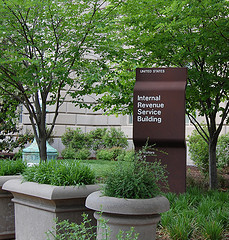Legislation Would Prevent IRS From Providing Pre-Filled Tax Returns
The Free File Program Act of 2013 was introduced in Congress in February by the bipartisan pair of Illinois representative Peter Roskam and Congressman Ron Kind of Wisconsin, who each received some of the millions that Intuit and others have been pumping into the coffers of federal lawmakers in recent years.
According to OpenSecrets, Roskam received $4,000 from Intuit in 2012, second in the Congress only to Kind with $4,400. Between direct contributions from Intuit’s PAC and money from company execs, Roskam and Kind have each taken in more than $12,000 over the last two election cycles.
The legislation would make permanent the no-compete the agreement between the IRS and the tax-prep consortium. On the one hand, while that would mean Free File is sticking around, the law says the IRS “may not establish, develop, sponsor, acquire, or make available” electronic filing service or tax software.
The bill, which was previously introduced by Roskam in 2011, is just an extension of the lobbying efforts by Intuit and others. The tax-prep industry is afraid that the IRS might offer a so-called “return-free” service, which provides the consumer with a return already filled in with the relevant data provided by the employer.
There are valid concerns about the possibility for errors in such a system, but rather than craft rules and legislation that would minimize such concerns and provide possible remedies for consumers, this bill just wants to prevent the IRS from even offering the service.
Proponents of the legislation also say that Free File is widely used and available to consumers, but ProPublica reports that only 3.5 million taxpayers used the service in 2012.
Return-free systems are already in place in various parts of Europe. California began offering a similar service, ReadyReturn, in 2005, but fewer than 100,000 residents of the state used it last year.
Meanwhile, Illinois Congressman Bill Foster has recently introduced a bill of his own [PDF] that would actually create such a system for offering return-free service at a federal level.
“Our tax code is complicated enough, we shouldn’t be asking taxpayers to submit information the IRS already has,” explains Foster.
Given that most bills stand an ice cube’s chance in hell at even making it to the House floor, this may be all for nothing. But it’s certainly a topic that will only be brought up again as the deal between the IRS and the tax-prep consortium nears expiration.
Republicans and Dems Come Together — to Keep IRS From Competing with TurboTax [ProPublica]
Want more consumer news? Visit our parent organization, Consumer Reports, for the latest on scams, recalls, and other consumer issues.


